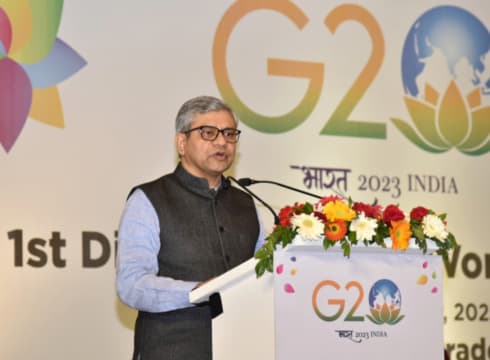Even though there are challenges that shroud AI on transparency and privacy violations, IT Ministers believes that the technology is a strategic fit for country’s development
AI will have a ‘kinetic effect’ on the growth of entrepreneurship and business in the country: Vaishnaw
IT minister’s statement has come a few days after Zoho CEO Sridhar Vembu wrote to the Centre, seeking an immediate action to regulate AI systems
Inc42 Daily Brief
Stay Ahead With Daily News & Analysis on India’s Tech & Startup Economy
A few days after Zoho chief Sridhar Vembu called for immediate steps to regulate artificial intelligence (AI) systems, the Union government has now said that it has no plans to promulgate any legislation on the matter.
“The government is not considering bringing a law or regulating the growth of artificial intelligence in the country,” Information Technology Minister Ashwini Vaishnaw told the Parliament on Wednesday (April 5).
He made the comments while responding to Member of Parliament Shyam Singh Yadav’s query on whether the government was looking to take steps to regulate AI in the country.
While calling AI a significant and strategic area for the country, the minister pointed out that AI had many ethical concerns and risks, owing to issues such as bias in decision-making, privacy violations, and lack of transparency, among others.
To allay these concerns, Vaishnaw said that various government arms were working to standardise responsible development of AI and adopt best practices. The government also views AI as having a ‘kinetic effect’ on the growth of entrepreneurship and business in the country.
In response to a separate question, Minister of State (MoS) for Electronics and Information Technology Rajeev Chandrasekhar said that while OpenAI’s ChatGPT has made significant strides, there were still many challenges with such Large Language Models (LLMs).
Touting the National Program on Artificial Intelligence (IndiaAI), he added that the government was leveraging AI technologies to foster inclusion and innovation.
India’s AI Push
Vaishnaw also underlined a slew of steps undertaken to shore up the deployment and development of AI systems in the country.
MeitY in coordination with the Centre for Development of Advanced Computing (C-DAC) has initiated a proof-of-concept project on AI Research, Analytics and Knowledge Dissemination Platform (AIRAWAT) to provide a common computing platform for AI research and knowledge assimilation.
This infrastructure is expected to be available for use by startups, labs, and other research institutions. Developed with 200 petaflops mix precision AI machine, this AI computing platform will be scalable to a peak capacity of 1 AI exaflop.
National Informatics Centre (NIC) has also established an AI centre of excellence (CoE) AI to facilitate AI-as-a-Service (AaaS) on in-house built Meghraj cloud.
Through the National Strategy for Artificial Intelligence, which was unveiled in 2018, and IndiaAI initiatives, the government aims to set up a comprehensive programme for leveraging emerging technologies for social impact.
For startups, the Centre aims to deploy CoEs to provide these new-age tech companies with plug-and-play co-working spaces and access to the ecosystem.
On the manpower front, MeitY has introduced the Future Skills PRIME programme to reskill and upskill existing IT workers in newer emerging domains such as AI and blockchain.
Authorities have also developed an Open Government Data (OGD) platform, which has opened up 6.01 Lakh data sources from various central and state departments for startups and platforms looking to avail such data.
Earlier this year, multiple new schemes, including Digital India Bhashini and Digital India GENESIS, were launched to push the implementation of AI systems in the country.
While Digital India BHASHINI involves building AI-based solutions for Indian languages, Digital India GENESIS will fund 10,000 deeptech startups over the next five years, with a primary focus on Tier-II and III cities.
Regarding regulations, Vaishnaw said that the Centre has already concluded a public consultation on the draft National Data Governance Policy, which would set a regulatory benchmark for access to data resources for ‘emerging technology needs’.
As the growth and deployment of AI systems gather steam, many critics have sought to pause all developments related to AI systems stronger than OpenAI’s recently launched generative AI platform GPT-4.
Earlier this week, Zoho CEO and cofounder Sridhar Vembu sought the government’s intervention to regulate the emerging space and called for taming any prospective AI monopolies. Noting that millions of jobs were at risk, he added that the technology, while being transformative, could potentially be catastrophic for humanity.
As the tech war intensifies between Google and Microsoft over AI development and deployment, many have a glimpse into the future and what is yet to come.
As of now, the space continues to grow comfortably and appears to be headed for a great year ahead. Pegged at $2.76 Bn in 2020, the homegrown AI software market, as per an IDC report, is expected to grow to $7.8 Bn by 2025.
{{#name}}{{name}}{{/name}}{{^name}}-{{/name}}
{{#description}}{{description}}...{{/description}}{{^description}}-{{/description}}
Note: We at Inc42 take our ethics very seriously. More information about it can be found here.


